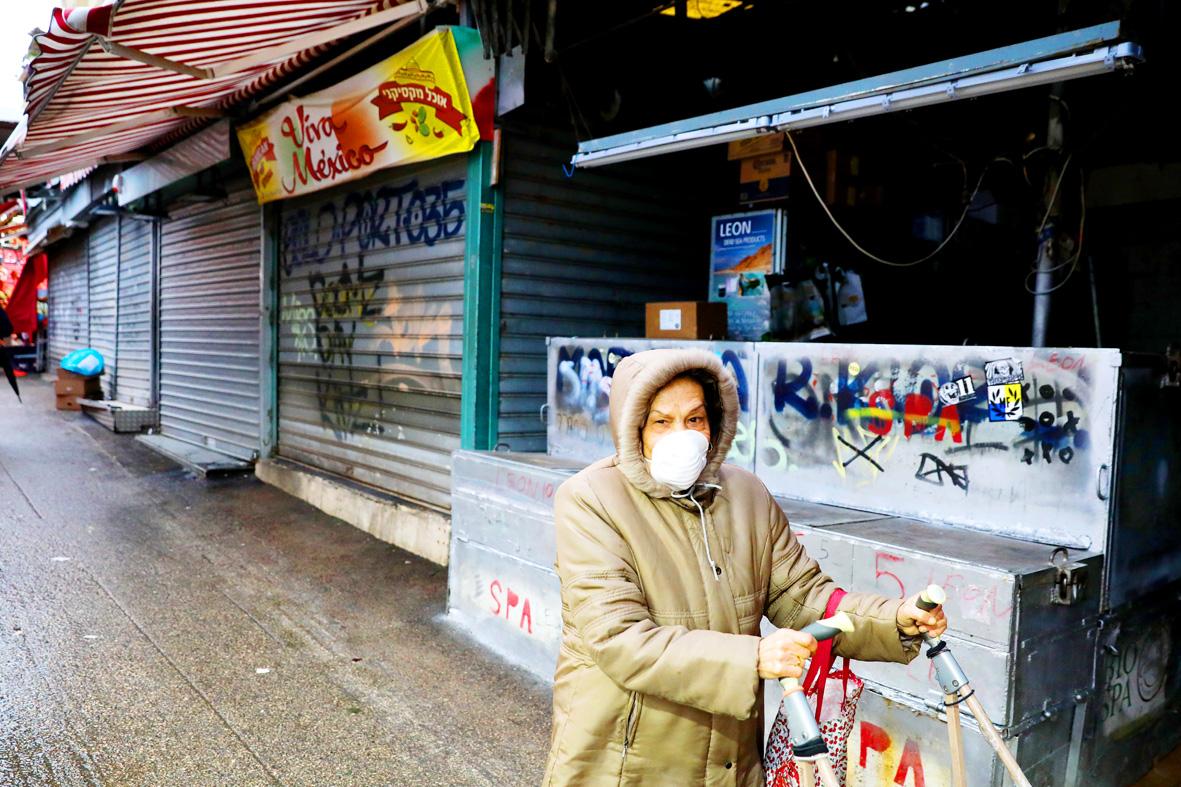The head of Israel’s shadowy Shin Bet internal security service on Tuesday said that his agency received Cabinet approval overnight to start deploying the agency’s phone surveillance technology to help curb the spread of COVID-19 in Israel, a move that sparked widespread criticism from lawmakers and civil rights groups.
Nadav Argaman acknowledged that using the agency’s counter-terrorism capabilities to track sick Israeli citizens deviates from Shin Bet’s typical operations against Palestinian militants, but he said the goal was still in line with its overall mission of “saving lives.”
The move was announced by Israeli Prime Minister Benjamin Netanyahu as part of a series of sweeping measures to stop the outbreak and immediately raised concerns from civil-liberties advocates that the practice would raise serious privacy issues.

Photo: EPA-EFE
On Tuesday, in a live televised announcement, Netanyahu said that the technology had been deployed, calling the strategy “critical” to slowing the outbreak.
The final go-ahead also came on the day that a new Israeli legislature was sworn in following the country’s third election in less than a year — meaning that it bypassed the typically required oversight of a special parliamentary subcommittee that had already begun reviewing the measures.
Argaman said there would be stringent oversight to maintain individual privacy, and that operatives would only use their geolocation findings from cellphones and credit card use to warn those that might be exposed to the virus — rather than enforcing any government-mandated quarantine.
“The other state bodies don’t have the necessary technological means to aid this effort,” Argaman said in a statement. “I am well aware of the sensitivity of this matter, and therefore have instructed that only a very limited number of agents will be handling this and the information will not be saved in the Shin Bet database.”
Still, criticism over the move and its unchecked approval was swift.
Gabi Ashkenazi, a retired military chief who headed the special parliamentary subcommittee in the outgoing parliament, called the government approval a “heist in the dead of night.”
His centrist Blue and White party chief and fellow retired military chief, Benny Gantz, also criticized the move.
“These are exceptional times that, unfortunately, call for exceptional measures in order to save lives. That said, we cannot surrender transparency and oversight,” said Gantz, Netanyahu’s chief rival in the elections. “A functional parliament, even and especially in states of emergency, is a hallmark of democracy and we will be steadfast in preserving it.”
However, Netanyahu said that delaying the deployment of the measures could “lead to the deaths of a great many Israelis.”
The technology has never been used before on civilians and would involve a certain degree of breach of privacy, but the unprecedented health threat posed by the virus justifies its use, Netanyahu said.
“These means will help us greatly in locating the ill and thus stopping the spread of the virus,” he said in a televised announcement late on Monday. “We will approve these digital tools for a limited period of 30 days. Israel is a democracy and we have to balance individual rights with the greater needs of all.”

POLITICAL PRISONERS VS DEPORTEES: Venezuela’s prosecutor’s office slammed the call by El Salvador’s leader, accusing him of crimes against humanity Salvadoran President Nayib Bukele on Sunday proposed carrying out a prisoner swap with Venezuela, suggesting he would exchange Venezuelan deportees from the US his government has kept imprisoned for what he called “political prisoners” in Venezuela. In a post on X, directed at Venezuelan President Nicolas Maduro, Bukele listed off a number of family members of high-level opposition figures in Venezuela, journalists and activists detained during the South American government’s electoral crackdown last year. “The only reason they are imprisoned is for having opposed you and your electoral fraud,” he wrote to Maduro. “However, I want to propose a humanitarian agreement that

ECONOMIC WORRIES: The ruling PAP faces voters amid concerns that the city-state faces the possibility of a recession and job losses amid Washington’s tariffs Singapore yesterday finalized contestants for its general election on Saturday next week, with the ruling People’s Action Party (PAP) fielding 32 new candidates in the biggest refresh of the party that has ruled the city-state since independence in 1965. The move follows a pledge by Singaporean Prime Minister Lawrence Wong (黃循財), who took office last year and assumed the PAP leadership, to “bring in new blood, new ideas and new energy” to steer the country of 6 million people. His latest shake-up beats that of predecessors Lee Hsien Loong (李顯龍) and Goh Chok Tong (吳作棟), who replaced 24 and 11 politicians respectively

Young women standing idly around a park in Tokyo’s west suggest that a giant statue of Godzilla is not the only attraction for a record number of foreign tourists. Their faces lit by the cold glow of their phones, the women lining Okubo Park are evidence that sex tourism has developed as a dark flipside to the bustling Kabukicho nightlife district. Increasing numbers of foreign men are flocking to the area after seeing videos on social media. One of the women said that the area near Kabukicho, where Godzilla rumbles and belches smoke atop a cinema, has become a “real

‘WATER WARFARE’: A Pakistani official called India’s suspension of a 65-year-old treaty on the sharing of waters from the Indus River ‘a cowardly, illegal move’ Pakistan yesterday canceled visas for Indian nationals, closed its airspace for all Indian-owned or operated airlines, and suspended all trade with India, including to and from any third country. The retaliatory measures follow India’s decision to suspend visas for Pakistani nationals in the aftermath of a deadly attack by shooters in Kashmir that killed 26 people, mostly tourists. The rare attack on civilians shocked and outraged India and prompted calls for action against their country’s archenemy, Pakistan. New Delhi did not publicly produce evidence connecting the attack to its neighbor, but said it had “cross-border” links to Pakistan. Pakistan denied any connection to